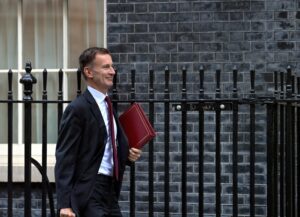The chancellor has more wiggle room to cut taxes or increase spending than expected after government borrowing last year came in £13.2 billion less than the Office for Budget Responsibility forecast.
Borrowing rose to £139.2 billion, the fourth highest since records began and £18.1 billion more than the previous year, figures from the Office for National Statistics (ONS) showed.
However, government debt has risen to its highest level as a share of the economy since the aftermath of the Second World War and is nearly equal to the size of the economy.
Public sector debt hit £2,530.4 billion in the financial year to the end of March. Total debt is now at 99.6 per cent of gross domestic product (GDP), which is the main measure of the size of the economy. Debt was 251.8 per cent of GDP right after the Second World War in 1947, and fell to 102.5 per cent by 1961.
Debt was at around 80 per cent of GDP before the pandemic, but shot up owing to the cost of government support to keep households and businesses afloat through the coronavirus crisis. The furlough scheme and the government’s energy bill subsidies, together with several months of record interest payments on government debt due to soaring inflation, have all pushed up the borrowing bill.
Interest payable on the government debt increased to £106.6 billion over the year, £34 billion more than in the previous financial year, driven by a rise in the retail prices index, to which index-linked gilts are pegged. RPI was 13.5 per cent in March.
Public sector net borrowing in March reached £21.5 billion, lower than a consensus among City economists, who had expected the figure to rise to £22.8 billion.
March marked another month of strong tax receipts, with total income from receipts rising to £81 billion, up by £1.6 billion compared with last March. This was offset by total expenditure rising to £84.4 billion, well above the £80.2 billion recorded in the same period last year.
Ruth Gregory, deputy chief UK economist at the Capital Economics consultancy, said: “The news that total borrowing in 2022/23 was £13.2 billion lower than the Office for Budget Responsibility predicted only a month ago provides the chancellor with more wiggle room to cut taxes/raise spending ahead of the next general election.”
She said that, with the next general election approaching, she “wouldn’t be at all surprised to see a further fiscal loosening in the autumn statement, on top of the £21.9 billion (0.8 per cent of GDP) giveaway in 2023/24 announced in the spring”.
Gregory added: “That said, with both parties likely to stick to current plans to bring down public debt as a share of GDP, a sizeable fiscal tightening will still be required after the election, whoever is in charge.”
Samuel Tombs, chief UK economist at Pantheon Macroeconomics, the consultancy, said public borrowing in March was substantially higher than a year ago mainly due to changes to the statistical treatment of student loans.
“These changes accounted for £7.2 billion of the £10.6 billion year-over-year jump in central government net investment,” he said. “In addition, current expenditure was £34.2 billion higher than a year ago primarily due to a £6 billion rise in subsidies, reflecting the cost of limiting the increase in energy prices for both households and businesses.”
Jeremy Hunt, the chancellor, said: “These numbers reflect the inevitable consequences of borrowing eye-watering sums to help families and businesses through a pandemic and Putin’s energy crisis.
“We stepped up to support the British economy in the face of two global shocks, but we cannot borrow for ever. We now have a clear plan to get debt falling, which will reduce the financial pressure we pass on to our children and grandchildren.”
Read more:
Hunt has scope for tax cuts as government borrowing is £13Bn less than planned


























